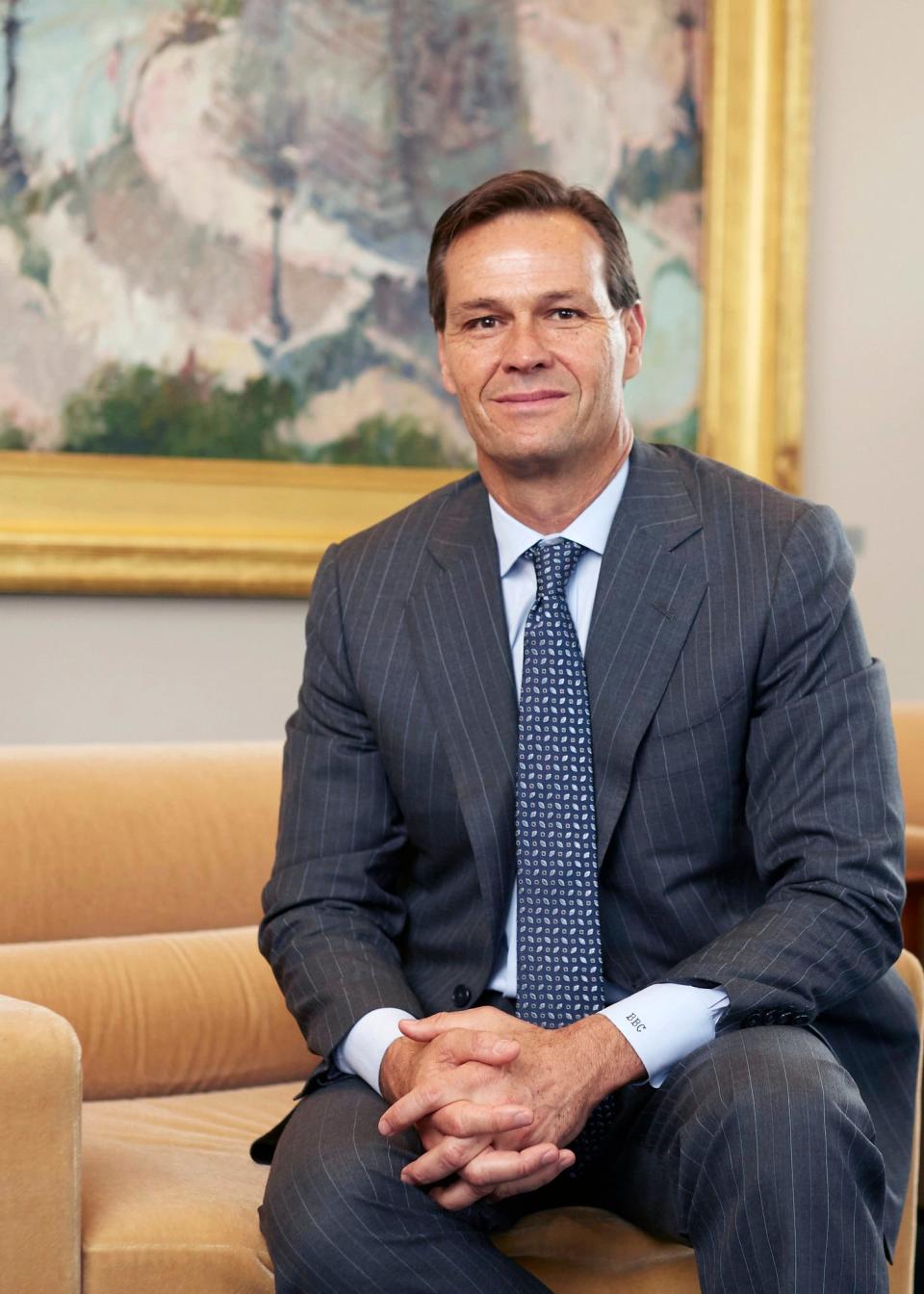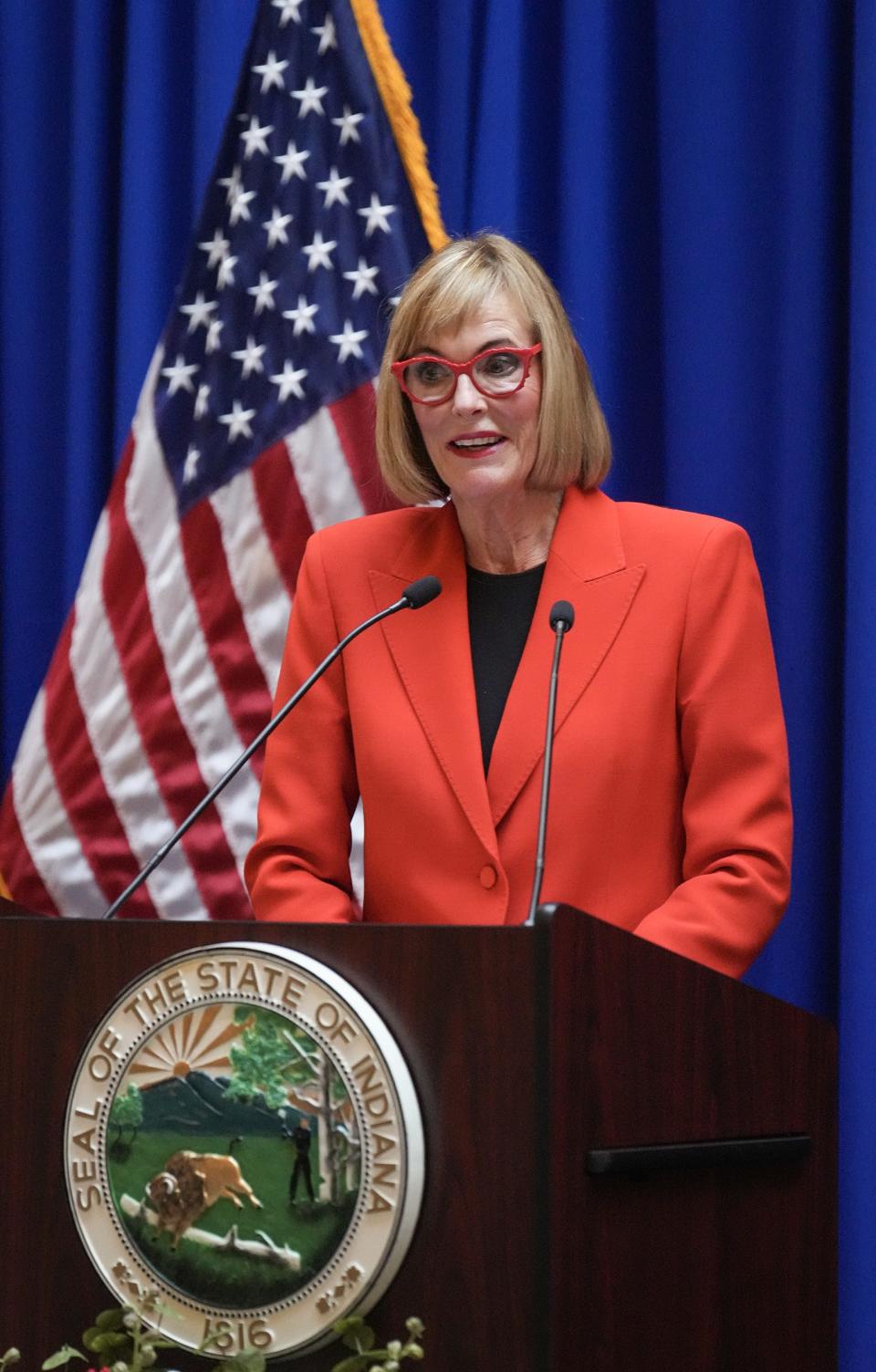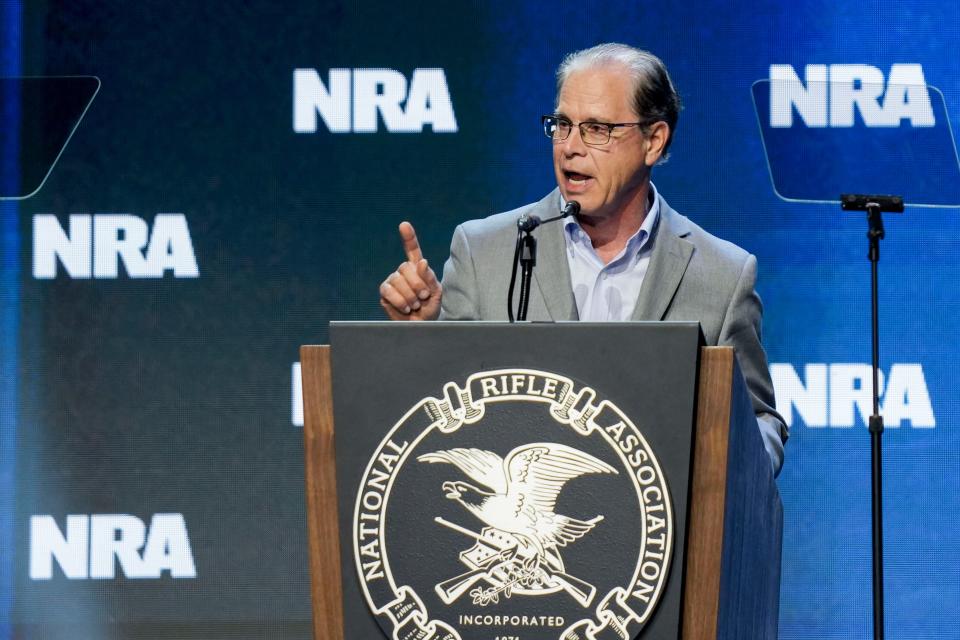Race to the right: How culture wars impact the Indiana governor's race
- Oops!Something went wrong.Please try again later.
- Oops!Something went wrong.Please try again later.
- Oops!Something went wrong.Please try again later.
- Oops!Something went wrong.Please try again later.
A cascade began one day in late July when Republican gubernatorial candidate Eric Doden retweeted a screenshot of an Indiana Department of Health tweet, which had been deleted, advertising an upcoming breastfeeding conference and using the language "chest/breastfeeding families."
"The woke language games end Day 1 when I’m Governor," Doden tweeted. The next day, Lt. Gov. Suzanne Crouch called the term "demeaning" by "diluting" women's place in society. Soon after, Attorney General Curtis Hill joined in, saying he would direct state agencies to get rid of any "radical degendering language" like chestfeeding.
While the language is inclusive of transgender and nonbinary-gendered individuals, according to CDC guidance, within Indiana's Republican gubernatorial primary, it's the kind of culture-war low-hanging fruit that candidates can grab onto to prove themselves as solidly conservative. While the May 2024 primary is so far away most Hoosiers probably haven't started thinking much about it, it's clear Republicans are racing to the right.
They believe the Republican base has grown ultraconservative and so have struck a tone that departs from the more pragmatic reputations of Govs. Eric Holcomb and Mitch Daniels. And even Mike Pence, a staunch social conservative, largely stayed away from those issues when campaigning for governor.
Indiana hasn't had a gubernatorial primary this competitive in living memory ― five well-known, well-funded candidates ― and conditions are ripe for a piling-on effect on culture-war topics such as parental rights in schools and transgender issues. This effect may have real implications for the Indiana GOP's success in future general elections, should party nominees continue to get far to the right of moderate voters; but given the state's current electoral math and Democrats' underfunded candidate bench, most still see 2024's gubernatorial race as a lock for Republicans, no matter who the nominee ends up being.
Republican primary voters' choices are Doden, Crouch, Hill, U.S. Sen. Mike Braun and former commerce secretary Brad Chambers. All except Chambers have weaved social issues into their platform.
Indiana 2024 governor candidates: Here's who's running for governor in 2024

Too early for specifics
At this stage, candidates are establishing their conservative credentials, planting their feet in the same conservative circles on the social issues without getting into too many specifics.
So far, gubernatorial candidates who have talked about abortion, for example, stick to rhetoric about opposing abortion, largely approving of what the legislature drew up and not suggesting the state go further.

Some have made policy proposals that are more specific, like Crouch's plan to eliminate the state's income tax or Doden's zero-cost adoption proposal. They also are layering their social stances with an equal if not larger focus on kitchen-table issues such as taxes, inflation and quality of life.
Among candidates who responded to an IndyStar inquiry about the importance of social issues to their campaigns, there's a sense that they will play a role, but not be the sole ticket to a winning strategy.
"(Social issues) are a crucial part of my message to Hoosiers, but it would be a mistake to think economic freedom doesn’t play a role in how we tackle social issues in our state ― having access to adequate and beneficial health care being an example," Crouch told IndyStar. "There is an important balance that needs to be achieved."
Hill said social issues are kitchen-table issues.
"To effectively tackle challenges like taxes, inflation, and stagnant economic growth, we must remain steadfast in our values," he said. "If we compromise on our principles, it raises concerns about the possibility of yielding to progressive economic policies that will worsen the already troubling economic conditions."
Doden said he considers being anti-abortion not only a religious issue, but a human-rights issue.
"I know 'social issues' often seem to divide us, but a policy like zero-cost adoption could unite us on a divisive topic," he said. "I will lead and serve all Hoosiers as governor, even those that don’t agree with me."

It's likely too early for candidates to feel the need to get too specific on culture war issues, Purdue University Fort Wayne profesor emeritus Andy Downs said. If they want to catch voters' attention with some brow-raising proposal or policy stance, they may want to time it closer to the election so that voters remember.
"You can’t use your good stuff early," he said.
Is abortion Democrats' ticket?
The campaign of the Democrats' only gubernatorial candidate, former state superintendent of public instruction Jennifer McCormick, is putting out a message that abortion rights could be the issue that mobilizes voters in the 2024 general election ― that moderate and independent voters will decide Republicans have gone too far and will choose a Democrat.
The campaign commissioned Public Policy Polling to ask 663 Hoosier voters, about 40% of whom were Republican, 27% Democrat and 33% independent, who they would vote for if the choice were McCormick or the poll's GOP frontrunner, U.S. Sen. Mike Braun. Respondents gave Braun an 11-point lead. But when the question was asked in a way that mentioned each candidate's position on Indiana's near-total abortion ban ― that McCormick would try to reverse it, and that Braun was "excited to enforce" it ― the two candidates were nearly tied.
There's reason to place stock behind abortion as a wedge issue: When put to the voters through referendums, voters in conservative states such as Kentucky and Ohio have delivered victories for the abortion rights movement.
But Indiana's Republican supermajority almost certainly won't put abortion on the ballot. The Republican margin in statewide races is very comfortable ― Donald Trump won the state by 16 points in 2020 ― and it's unclear that there would be enough independent voters, young voters and women voters who have either sat on the sidelines or voted for Republicans in the past, to change their votes and help Democrats overcome this gap.
"You have to convince primary voters not only that that person is too far right but that Democrats would be the better choice,"said Elizabeth Bennion, political science professor at IU South Bend. "And that can be a tough sell."
Given the electoral math a Democrat would be up against, they'd have to be extremely well-funded and run an air-tight campaign, said Kip Tew, a consultant and former chair of the Indiana Democratic Party. He thinks that means raising between $12 million to $15 million within the next year. McCormick has about $200,000 in the bank.
"You’re not gonna just get lucky," he said. "You gotta do everything right to win."
2024 primaries: Possible 'tipping point' for Indiana Republican's future
There doesn't appear to be another up-and-coming Democratic candidate yet. And former U.S. Sen. Joe Donnelly, who cinched the Democrats' last state-wide victory in 2012, is definitely not interested, longtime aide Peter Hanscom said.
Further, Republicans have only strengthened their hold on the state since Indiana lawmakers passed the abortion law, which bans abortion except in cases where the mother's life is at risk or in cases of rape or incest up to 10 weeks, in July 2022.
Democrats are far more likely to successfully use abortion to make gains in certain local elections, such as in Marion or Hamilton counties, where Republicans are more vulnerable to challenge, said Laura Merrifield Wilson, political science professor at the University of Indianapolis.

There's nuance in how Hoosiers view abortion, and the extremes tend to be in the minority. Various surveys have shown that Hoosiers are fairly split when asked simply whether abortions should be legal or illegal, but when drilling down to specifics, a majority of Hoosiers support abortions in the case of specific exceptions, like the health of the mother or rape.
That the resulting law ended up including those exceptions, and listening to the feedback of the majority, may provide less fodder for moderate Republicans to veer away from their party, Bennion said.
Plus, at this stage, Republicans in the gubernatorial race have far more name recognition. Public Policy Polling found that even among Democrats surveyed, a majority don't know McCormick.
"That makes it difficult to make one wedge issue catapult oneself into the governor's mansion," Bennion said.
The primary election is May 7, 2024.
Contact IndyStar state government and politics reporter Kayla Dwyer at kdwyer@indystar.com or follow her on Twitter @kayla_dwyer17.
This article originally appeared on Indianapolis Star: Indiana governor's race fueled by social issues
